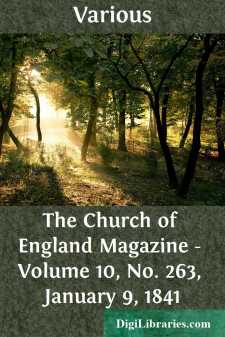Categories
- Antiques & Collectibles 13
- Architecture 36
- Art 48
- Bibles 22
- Biography & Autobiography 813
- Body, Mind & Spirit 142
- Business & Economics 28
- Children's Books 17
- Children's Fiction 14
- Computers 4
- Cooking 94
- Crafts & Hobbies 4
- Drama 346
- Education 46
- Family & Relationships 57
- Fiction 11829
- Games 19
- Gardening 17
- Health & Fitness 34
- History 1377
- House & Home 1
- Humor 147
- Juvenile Fiction 1873
- Juvenile Nonfiction 202
- Language Arts & Disciplines 88
- Law 16
- Literary Collections 686
- Literary Criticism 179
- Mathematics 13
- Medical 41
- Music 40
- Nature 179
- Non-Classifiable 1768
- Performing Arts 7
- Periodicals 1453
- Philosophy 64
- Photography 2
- Poetry 896
- Political Science 203
- Psychology 42
- Reference 154
- Religion 513
- Science 126
- Self-Help 84
- Social Science 81
- Sports & Recreation 34
- Study Aids 3
- Technology & Engineering 59
- Transportation 23
- Travel 463
- True Crime 29
The Church of England Magazine - Volume 10, No. 263, January 9, 1841
by: Various
Description:
Excerpt
There are some hearts little, if at all, impressed by the solemn requirements of the Almighty; so dead, in fact, to everything which relates not to the objects of time and sense, that they are unaffected by the scenes of vice and of the misery which is its consequence, every where presented to their notice. It is not until the mind is under the gracious influence of the Spirit of God, that men feel any anxiety to stop the torrent of evil, and endeavour to become the humble instruments of converting the sinner and saving his soul. Many, in fact, who feel deeply interested in their neighbours’ temporal comforts and prosperity, feel little anxious to supply their spiritual wants; and to this may be traced the opposition which is not unfrequently made, even by professing Christians, to institutions which have a direct tendency to improve the moral and spiritual condition of the human race.
Now there are many reasons which induce a truly converted man to labour for the spiritual benefit of others. First, there is the dishonour which men, in an unconverted state, cast upon God. This feeling operated on the mind of the psalmist, when he exclaimed (Ps. cxix. 53), “Horror hath taken hold of me, because of the wicked who forsake thy law.” For when men forsake God’s law, they declare that they are little impressed with a sense of the divine majesty and infinite goodness of the Almighty; that they are not anxious to know his will; that his threatenings alarm them not; that his promises in no way affect their hearts; that, in fact, they are not desirous of that favour which rests upon those only who walk in the path of his commandments. The psalmist’s zeal and jealousy for the glory of God were fully manifested by his anxiety to erect a house, in some respects suitable for the divine worship; by his earnest expressions, that the divine glory should be made known throughout the world, as when he exclaims “Tell it out among the heathen, that the Lord reigneth;” and this holy desire rendered every action, by which there was the most slight appearance of dishonour being cast upon Jehovah, abominable in his sight. When he reflected on his own departure from the law of his God, on those acts which had caused the enemies of the truth to blaspheme, he was indeed filled with horror. The language uttered, when from the depths he supplicated the divine forgiveness, powerfully demonstrates the agony of his soul—convinces us that his repentance was sincere, and that he was anxious that in every action of his life he might for the future glorify that Being whose gracious hand had conducted him through his earthly pilgrimage—whose favour had raised him to the throne of Israel—the light of whose countenance had cheered him in many a dark and dreary hour—and whose comforts had refreshed his soul, when in the multitude of the thoughts within him he became dispirited and perplexed. The first and great commandment is, “Thou shalt love the Lord thy God with all thy heart.” The psalmist loved God, and on this account he was desirous that he should be had in reverence of all his intelligent creatures. He loved God; he was seized with horror when he beheld myriads uninfluenced by this principle, living in disobedience to this first commandment.
Sin is too often viewed by us merely with respect to its baneful influence on the happiness of society. It is condemned by us, and it is punished by us, not so much as it is the transgression of the law of God, as it has a tendency to produce evil in the world. And hence there are many offenders in God’s sight who by their conduct cast dishonour upon his name, who yet maintain a fair and respectable character when weighed in the world’s balance, nay, even are regarded with reverence and esteem. We punish the murderer, the thief, the robber, the perjured person. It is right that we should do so. The welfare of society demands it....












